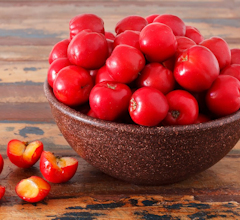Acerola Cherry
 The Acerola Cherry is a fruit-bearing shrub or tree that is native to South America. However, it is now also grown in other parts of the world and has been cultivated in various tropical and sub-tropical regions, including Australia.
The Acerola Cherry is a fruit-bearing shrub or tree that is native to South America. However, it is now also grown in other parts of the world and has been cultivated in various tropical and sub-tropical regions, including Australia.
Acerola Cherries are mainly known for their high content of Vitamin C, carotenoids and phenolic compounds. This means that it has various health-promoting properties and researchers are studying its role in managing different health conditions.1
Health Benefits of Acerola Cherry
High Antioxidant Activity
Acerola Cherries are one of the best natural sources of Vitamin C and are rich in carotenoids and polyphenols. This means that the berries or their juice can be used to counter damage from free radicals. Regular intake of Acerola Cherries may be suitable for those living with chronic diseases like diabetes, heart conditions, general weakness or brain disorders. It may also have a role in an anti-aging program.2
Diabetes
Acerola Cherries seem to lower blood glucose in many ways. They seem to affect the absorption of glucose in the small intestine and can also be good at preventing a postprandial hyperglycemia state. Although to date, most evidence comes from studies of animals and, keeping in mind the content of various nutrients found in Acerola Cherries, they do seem to have a place in being beneficial in the management of diabetes.3
Antimicrobial
Acerola Cherries are antimicrobial and can suppress certain bacterial infections. Although its practical implications are unclear, consumption of Acerola Cherries may benefit those prone to seasonal illnesses.4
Hepatoprotective and Liver Supporting
Acerola Cherry juice is rich in Vitamin C, phenolic compounds, anthocyanins, flavonols, and because of this they may exert hepatoprotective action, or prevent damage to the liver. Studies show that regular intake of Acerola Cherries and their juice may help reduce inflammatory biomarkers of the liver and may also have a positive influence on the lipid profile. It seems that Acerola Cherry juice is also suitable for protecting the liver from ethanol-related toxicity.5
Lowers Cholesterol
Acerola Cherry juice can help lower cholesterol and triglyceride levels in those living with diabetes. It may also help increase HDL levels, thus having a beneficial effect on cardiovascular health. Acerola Cherry juice may help fight cardiovascular ailments. To date, most evidence comes from studies in animal models. However, keeping in mind its nutritional value and safety profile, Acerola Cherry juice may be considered for people needing to normalise their lipid profile.6,7
Modern medical science is still discovering various health benefits of Acerola Cherries. Science has studied it in various experimental studies in laboratories and animal models. However, there is still a need for more extensive clinical studies in humans. Nonetheless, one may use Acerola Cherries and it’s juice or extracts with confidence to fight various health conditions, as it is rich in multiple nutrients.
Acerola Cherry Side Effects
There are no known side effects of Acerola Cherry. Experience shows that it can be used for long periods without experiencing any unwanted effects. However, some individuals may complain about gastric disturbances. Or in rare cases, it may cause allergic reactions.
Properties
- Anti-Aging2
- Anti-Bacterial4
- Anti-Inflammatory2
- Antimicrobial4
- Antioxidant2
- Brain Function / Neuroprotective2
- Cardiovascular Support6,7
- Cholesterol6,7
- Diabetes / Blood Sugar3
- Enhances Strength1
- Heart Support / Health6,7
- High/Good Levels of Polyphenols1
- High/Good Levels of Vitamin C1
- Liver Health5
- Oxidation Reduction2
- Toxin Removal1
References
- Belwal T, Devkota HP, Hassan HA, et al. Phytopharmacology of Acerola (Malpighia spp.) and its potential as functional food. Trends in Food Science & Technology. 2018;74:99-106. doi:10.1016/j.tifs.2018.01.014
- Mezadri T, Villaño D, Fernández-Pachón MS, García-Parrilla MC, Troncoso AM. Antioxidant compounds and antioxidant activity in acerola (Malpighia emarginata DC.) fruits and derivatives. Journal of Food Composition and Analysis. 2008;21(4):282-290. doi:10.1016/j.jfca.2008.02.002
- Loureiro G, Martel F. The effect of dietary polyphenols on intestinal absorption of glucose and fructose: Relation with obesity and type 2 diabetes. Food Reviews International. 2019;35(4):390-406. doi:10.1080/87559129.2019.1573432
- Delva L, Goodrich‐Schneider R. Antioxidant activity and antimicrobial properties of phenolic extracts from acerola (Malpighia emarginata DC) fruit. International Journal of Food Science & Technology. 2013;48(5):1048-1056. doi:10.1111/ijfs.12061
- Gomes Rochette NF, Mota EF, Nunes-Pinheiro DCS, et al. Effect of the pretreatment with acerola (Malpighia emarginata DC.) juice on ethanol-induced oxidative stress in mice – Hepatoprotective potential of acerola juice. Free Radicals and Antioxidants. 2013;3:S16-S21. doi:10.1016/j.fra.2013.10.004
- Sm B, Dc D, Ap S, et al. Evaluation of glycemic and lipid profile of offspring of diabetic Wistar rats treated with Malpighia emarginata juice. Experimental diabetes research. 2011;2011. doi:10.1155/2011/173647
- Batista KS, Alves AF, Lima M dos S, et al. Beneficial effects of consumption of acerola, cashew or guava processing by-products on intestinal health and lipid metabolism in dyslipidaemic female Wistar rats. Br J Nutr. 2018;119(1):30-41. doi:10.1017/S0007114517003282
